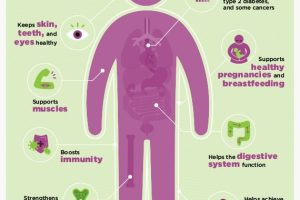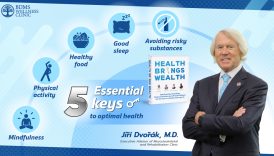Cracking the Nutritional Benefits: A Path to a Healthier Lifestyle

Importance of Nutrition
Nutrition is fundamental to our overall well-being, serving as the foundation for a healthy lifestyle. A balanced diet provides the energy and nutrients our bodies need for daily activities and long-term health. Instead of viewing nutrition as a restrictive regimen, it can be an enjoyable journey of discovery.
- Cracking the Nutritional Benefits: A Path to a Healthier Lifestyle
- Importance of Nutrition
- Link Between Nutrition and Health
- Understanding Macronutrients
- Carbohydrates and their Role
- Proteins for Optimal Health
- Exploring Micronutrients
- Vitamins for Vitality
- Minerals and Their Functions
- Dietary Fiber and Gut Health
- Benefits of Fiber
- Gut Microbiota and Digestive Health
- Antioxidants and Disease Prevention
- Role of Antioxidants
- Foods High in Antioxidants
- Hydration and its Impact
- Importance of Staying Hydrated
- Benefits of Drinking Water
- Balancing Macronutrients for Weight Management
- Understanding Caloric Needs
- Tips for Balanced Meals
- Meal Planning and Prepping for Success
- Importance of Meal Planning
- Benefits of Meal Prepping
- Superfoods for Optimal Nutrition
- Definition of Superfoods
- Incorporating Superfoods into Diet
- Sustainable Eating Habits
- Impact of Food Choices on Environment
- Tips for Sustainable Eating
- Addressing Nutrient Deficiencies
- Common Nutrient Deficiencies
- Ways to Correct Nutrient Deficiencies
- XII. The Role of Nutritional Supplements
- Benefits of Supplements
- Factors to Consider Before Taking Supplements
- XIII. Mindful Eating for Better Health
- Practicing Mindful Eating
- Benefits of Mindful Eating
- XIV. Healthy Eating on a Budget
- Tips for Affordable Healthy Eating
- Budget-Friendly Nutritious Foods
- XV. Conclusion
- Summary of Key Nutritional Benefits
- Steps to Achieve a Healthier Lifestyle
- Vital Energy Source: Nutrients fuel our physical and mental activity.
- Supports Growth: Essential for children, adolescents, and even adults to maintain healthy bodily functions.
- Prevents Chronic Diseases: A nutritious diet can lower the risk of conditions like diabetes, heart disease, and obesity.
Link Between Nutrition and Health
The relationship between nutrition and health cannot be overstated. What we consume directly impacts how we feel and function. For instance, during a busy week, opting for fast-food meals might provide convenience but often leads to lethargy and mood swings. A well-rounded diet rich in whole foods promotes vitality and reduces the risk of nutritional deficiencies. Consider these connections:
- Weight Management: Healthy eating choices support weight control.
- Mental Health: Certain vitamins and minerals play roles in mood regulation.
- Immune Function: Nutrients such as vitamin C strengthen our immune response.
By understanding the importance of nutrition, individuals can make informed choices that significantly enhance their health and quality of life.
Understanding Macronutrients
Carbohydrates and their Role
Carbohydrates often get a bad rap, especially with the rise of low-carb diets, but they are essential for our energy needs. Think of carbohydrates as the body’s preferred fuel source: they provide quick energy that powers your workouts, your brain, and daily activities.
- Types of Carbs:
- Simple Carbohydrates: Found in fruits and dairy; offer quick energy.
- Complex Carbohydrates: Found in whole grains, vegetables, and legumes; provide sustained energy.
For instance, when preparing for a run, choosing oatmeal for breakfast can set you up for success, giving you lasting energy.
Proteins for Optimal Health
Proteins are often referred to as the building blocks of life. They are crucial for repairing tissues, producing enzymes, and supporting immune function. Incorporating a variety of protein sources into your diet ensures you get all essential amino acids.
- Sources of Protein:
- Animal-Based: Lean meats, fish, eggs, and dairy products.
- Plant-Based: Beans, lentils, nuts, and tofu.
Personal experiences vary, but many find that adding more protein to their meals, such as grilled chicken in salads or chickpeas in soups, amplifies their energy levels and keeps hunger at bay. Balancing carbohydrates and proteins in meals leads to a well-rounded diet that supports overall health and wellness.
Exploring Micronutrients
Vitamins for Vitality
While macronutrients like carbs and proteins are essential for energy and growth, vitamins play a pivotal role in maintaining our health and vitality. Each vitamin serves a unique and vital function for the body. For instance, vitamin C is a powerful antioxidant and can boost your immune system, while B vitamins play a critical role in energy production.
- Key Vitamins and Their Benefits:
- Vitamin A: Supports vision and immune function.
- Vitamin D: Crucial for bone health and calcium absorption.
- Vitamin E: Protects against oxidative stress.
Incorporating colorful fruits and vegetables into your meals, like oranges for vitamin C or leafy greens for vitamin A, can enhance overall wellness.
Minerals and Their Functions
Just as vitamins are vital, minerals are equally important for the body’s functionality. These inorganic nutrients help build bones, create hormones, and maintain heartbeat regularity.
- Essential Minerals:
- Calcium: Needed for strong bones and teeth.
- Iron: Crucial for transporting oxygen in the blood.
- Potassium: Helps regulate fluid balance and nerve signals.
For instance, adding a handful of spinach (rich in iron and potassium) to a smoothie can be a simple way to boost your mineral intake. These small dietary changes can significantly contribute to your overall health and help you feel your best. Understanding the importance of both vitamins and minerals is key to achieving a balanced diet that enhances vitality and well-being.
Dietary Fiber and Gut Health
Benefits of Fiber
Dietary fiber is often overlooked, yet it plays a crucial role in digestive health and overall wellness. Fiber can be categorized into two types: soluble and insoluble, both offering unique benefits.
- Soluble Fiber:
- Helps lower blood cholesterol and glucose levels.
- Found in oats, beans, and fruits like apples.
- Insoluble Fiber:
- Promotes regular bowel movements and prevents constipation.
- Found in whole grains, nuts, and vegetables like carrots.
For example, adding a serving of beans to a salad not only ups the fiber but also creates a satisfying meal that keeps hunger at bay.
Gut Microbiota and Digestive Health
A healthy gut isn’t just about what you eat; it’s also about the thriving community of bacteria residing in your intestines, known as gut microbiota. Fiber acts as a prebiotic, a food source for these beneficial bacteria.
- Benefits of a Healthy Gut Microbiota:
- Aids digestion and nutrient absorption.
- Boosts the immune system and reduces inflammation.
- Influences mood and mental health.
Incorporating fiber-rich foods like whole grains, fruits, and vegetables enhances gut health, making it easier for the body to absorb essential nutrients. Personal experience shows that when fiber intake is high, it often leads to feeling lighter and more energized, showcasing the impact of dietary fiber on both gut and overall health.
Antioxidants and Disease Prevention
Role of Antioxidants
Antioxidants play a vital role in protecting our bodies from damage caused by free radicals, which can lead to chronic diseases like cancer, heart disease, and diabetes. By neutralizing these harmful molecules, antioxidants help maintain cellular integrity and promote overall health.
- How Antioxidants Function:
- They donate electrons to free radicals, stabilizing them.
- Support the immune system by reducing inflammation.
Incorporating a variety of antioxidants into your diet can enhance your body’s natural defenses. Personally, I’ve noticed improved energy levels and less fatigue when my meals are rich in these protective compounds.
Foods High in Antioxidants
The good news is that many delicious foods are packed with antioxidants. Incorporating these into your meals can be both enjoyable and beneficial.
- Top Antioxidant-Rich Foods:
- Berries: Blueberries, strawberries, and blackberries pack a powerful punch of vitamins and fiber.
- Dark Chocolate: A 70% cocoa content or higher offers effective antioxidant properties.
- Nuts: Walnuts and pecans provide healthy fats along with antioxidants.
- Green Tea: Contains catechins, which are potent antioxidants.
For a quick snack, a handful of mixed berries or a piece of dark chocolate can do wonders for your antioxidant intake, showcasing how simple and tasty choices can significantly enhance your health while aiding in disease prevention.
Hydration and its Impact
Importance of Staying Hydrated
Hydration is often an overlooked aspect of overall health, yet it is essential for nearly every bodily function. Our bodies are made up of about 60% water, which highlights its importance in maintaining balance and vitality. Dehydration can lead to fatigue, headaches, and decreased cognitive function.
- Signs of Dehydration:
- Dry mouth and skin.
- Dark yellow urine.
- Fatigue and dizziness.
I remember a time when I neglected my water intake while busy at work, and I felt sluggish by midday. Since then, I’ve made it a priority to keep a water bottle nearby throughout the day.
Benefits of Drinking Water
Drinking water not only quells thirst but also offers numerous health benefits. It’s a simple and effective way to support various bodily functions.
- Key Benefits of Adequate Hydration:
- Enhances Physical Performance: Water helps regulate body temperature and lubricate joints.
- Aids Digestion: Supports the breakdown of food and nutrient absorption.
- Boosts Skin Health: Keeps skin hydrated and may reduce signs of aging.
- Supports Weight Management: Sometimes thirst is mistaken for hunger; staying hydrated can help curb unnecessary snacking.
Incorporating water-rich foods like cucumbers and watermelon into meals and snacks can also help meet hydration needs. By prioritizing water intake, individuals can enjoy improved energy levels and overall well-being.
Balancing Macronutrients for Weight Management
Understanding Caloric Needs
To manage weight effectively, it’s vital to understand your caloric needs based on various factors like age, gender, activity level, and overall health goals. A good rule of thumb is to maintain a balance between calories consumed and calories burned.
- Estimating Caloric Needs:
- Basal Metabolic Rate (BMR): The number of calories your body needs at rest.
- Total Daily Energy Expenditure (TDEE): BMR plus calories burnt through physical activity.
For instance, using a BMR calculator helped me realize that I was underestimating my caloric needs, leading to unintentional weight loss.
Tips for Balanced Meals
Crafting balanced meals can further support your weight management journey. A well-rounded plate should ideally include a mix of macronutrients—carbohydrates, proteins, and fats.
- Components of Balanced Meals:
- Carbohydrates: Opt for whole grains like quinoa or brown rice.
- Proteins: Incorporate lean proteins like chicken, fish, or plant-based options like lentils.
- Fats: Healthy fats from avocados, nuts, or olive oil are beneficial.
A practical way to ensure balance is to fill half your plate with vegetables, a quarter with lean protein, and the remaining quarter with healthy carbohydrates. By planning meals mindfully and understanding caloric needs, achieving and maintaining a healthy weight can become a more attainable goal.
Meal Planning and Prepping for Success
Importance of Meal Planning
Meal planning is an invaluable tool for maintaining a balanced diet and achieving health goals. It involves strategizing your meals for the week, which can save time, money, and reduce stress during busy days. Having a plan in place not only simplifies grocery shopping but also minimizes the temptation to opt for unhealthy convenience foods.
- Key Reasons for Meal Planning:
- Saves Time: Less time spent wondering what to cook.
- Cost-Effective: Reduces impulse buying and food waste.
- Promotes Healthy Choices: Encourages variety and balanced meals.
I’ve found that organizing my meals on a Sunday provides clarity and peace of mind as the week unfolds.
Benefits of Meal Prepping
Meal prepping extends the advantages of planning by preparing meals or components in advance, making it even more convenient to eat healthily. This practice can significantly enhance dietary consistency and quality.
- Key Benefits of Meal Prepping:
- Time-Saving: Grab-and-go meals reduce the hassle during busy workdays.
- Portion Control: Helps manage portion sizes for better weight management.
- Reduced Stress: Knowing that meals are ready alleviates the pressure of daily cooking.
For example, I often prepare several servings of quinoa and roasted vegetables at once. These can serve as bases for various meals throughout the week. By focusing on meal planning and prepping, individuals can set themselves up for success, making it easier to stick to a nutritious dietary routine.
Superfoods for Optimal Nutrition
Definition of Superfoods
Superfoods are nutrient-dense foods that are packed with vitamins, minerals, antioxidants, and other beneficial compounds. They are considered to have exceptional health benefits, often promising to improve overall well-being and reduce the risk of chronic diseases. While the term “superfood” isn’t scientifically defined, it typically refers to foods that provide a high nutritional value relative to their calorie content.
- Characteristics of Superfoods:
- Rich in Antioxidants: Fight free radicals and reduce inflammation.
- High in Nutrients: Offers essential vitamins and minerals.
- Supports Health: Associated with improved heart health, weight management, and more.
I’ve often turned to foods like blueberries and kale for their impressive nutrient profiles, which give me an extra health boost.
Incorporating Superfoods into Diet
Integrating superfoods into your daily diet can be both fun and easy. By being creative, you can enhance the nutritional value of your meals without sacrificing taste.
- Easy Ways to Incorporate Superfoods:
- Smoothies: Add spinach and chia seeds for a nutrient-packed breakfast.
- Salads: Toss in avocado and walnuts for healthy fats and crunch.
- Snacks: Opt for dark chocolate or goji berries for a sweet yet healthy treat.
For instance, I love preparing overnight oats with almond milk, topped with sliced bananas and a sprinkle of chia seeds. It’s a delicious, energizing start to my day! Embracing superfoods is a simple way to elevate your nutrition and fuel your body for optimal health.
Sustainable Eating Habits
Impact of Food Choices on Environment
The food choices we make have profound effects on our planet. From the resources used to grow food to the impact of waste, our dietary habits play a significant role in environmental sustainability. For instance, animal agriculture generates a large amount of greenhouse gases and requires extensive water and land.
- Key Environmental Impacts:
- Greenhouse Gas Emissions: Meat and dairy production contributes significantly.
- Water Usage: Foods like almonds require vast amounts of water.
- Biodiversity Loss: Monoculture farming can deplete soil nutrients and harm ecosystems.
I’ve noticed how shifting to a more plant-based diet not only benefits my health but also lessens my carbon footprint.
Tips for Sustainable Eating
Adopting sustainable eating habits doesn’t have to be complicated. Simple changes can lead to a healthier planet, and they often enhance your personal nutrition as well.
- Practical Tips for Sustainable Eating:
- Choose Local Produce: Support local farmers and reduce transportation emissions.
- Eat Seasonal Foods: Seasonal foods often have a lower environmental impact.
- Reduce Meat Consumption: Try incorporating meatless days into your week.
- Minimize Food Waste: Plan meals properly and use leftovers creatively.
For example, I often plan meat-free meals on Mondays, exploring plant-based recipes, and it has expanded my culinary repertoire. By being mindful of our food choices, we can take meaningful steps toward sustainability while enjoying delicious and nutritious meals.
Addressing Nutrient Deficiencies
Common Nutrient Deficiencies
Despite our best efforts to maintain a balanced diet, many individuals face nutrient deficiencies that can impact health. Some of the most prevalent deficiencies include vitamin D, iron, calcium, and vitamin B12.
- Common Nutrient Deficiencies:
- Vitamin D: Essential for bone health and immune function, often lacking in those with limited sun exposure.
- Iron: Crucial for energy levels, especially common among women and vegetarians.
- Calcium: Important for maintaining strong bones but frequently under-consumed.
- Vitamin B12: Vital for nerve health, often lacking in vegetarian or vegan diets.
I’ve personally experienced low energy levels due to low iron, prompting me to adjust my diet.
Ways to Correct Nutrient Deficiencies
The good news is that nutrient deficiencies can often be corrected through dietary adjustments and mindful choices.
- Effective Strategies:
- Increase Food Variety: Incorporate a range of colorful fruits, vegetables, and whole grains.
- Focus on Fortified Foods: Look for dairy alternatives fortified with calcium and vitamin D or cereals rich in B12.
- Supplements: Consider appropriate supplements after consulting with a healthcare professional.
- Regular Monitoring: Keep track of your nutrient intake through food diaries or apps.
For instance, I’ve started including chickpeas and spinach in my meals for their iron content, and I’ve noticed a significant improvement in my energy. By addressing nutrient deficiencies proactively, individuals can enhance their overall health and well-being while enjoying a more balanced diet.
XII. The Role of Nutritional Supplements
Benefits of Supplements
Nutritional supplements can play a significant role in bridging the gap between dietary requirements and nutritional intake. They can be especially beneficial for individuals with specific deficiencies, dietary restrictions, or increased nutrient needs.
- Key Benefits of Nutritional Supplements:
- Convenience: Easy way to boost nutrient intake, particularly for busy lifestyles.
- Targeted Nutrition: Allow you to focus on specific deficiencies, like omega-3s or vitamin D.
- Support for Specific Needs: Helpful for athletes, pregnant women, or the elderly who may have unique nutritional requirements.
I’ve found that adding a daily multivitamin helps me feel more balanced, especially on especially hectic days.
Factors to Consider Before Taking Supplements
Before rushing to incorporate supplements into your routine, it’s essential to consider several factors to ensure they enhance your health rather than hinder it.
- Important Factors to Consider:
- Consultation with Healthcare Professional: Always seek advice to determine if supplements are necessary or safe for you.
- Quality of Supplements: Opt for reputable brands with third-party testing to ensure purity and potency.
- Dosage: Follow recommended dosages to avoid toxicity, especially with fat-soluble vitamins like A, D, E, and K.
- Dietary Balance: Prioritize obtaining nutrients through whole foods before relying on supplements.
I always remind myself that supplements should complement a healthy diet, not replace the benefits of whole foods. Being informed and cautious about supplements can lead to informed decisions that better support overall health and wellness.
XIII. Mindful Eating for Better Health
Practicing Mindful Eating
Mindful eating is an intentional approach to food that encourages awareness of your eating experience. It involves focusing on the sensory aspects of meals—sight, taste, smell, and texture—without distractions. To practice mindful eating, consider these steps:
- Slow Down: Take time to chew each bite thoroughly and appreciate the flavors.
- Limit Distractions: Eat without screens or multitasking to be present with your meal.
- Listen to Your Body: Pay attention to hunger and fullness cues, stopping when you feel satisfied.
I personally found that slowing down during meals transformed my relationship with food, making each bite more enjoyable.
Benefits of Mindful Eating
Adopting mindful eating habits can lead to a multitude of health benefits, enhancing both physical and mental well-being.
- Key Benefits:
- Improved Digestion: Eating slowly can promote better digestion and nutrient absorption.
- Weight Management: By tuning into hunger signals, you may be less likely to overeat.
- Enhanced Satisfaction: Enjoying food fully can increase satisfaction, reducing cravings for unhealthy snacks.
- Better Emotional Connection: Mindful eating fosters a healthier relationship with food, turning meals into experiences rather than obligations.
For example, since practicing mindful eating, I’ve noticed I no longer crave late-night snacking as frequently; my meals leave me feeling more fulfilled. By embracing mindful eating, individuals can cultivate a healthier, more enjoyable approach to food that benefits both body and mind.
XIV. Healthy Eating on a Budget
Tips for Affordable Healthy Eating
Eating healthy doesn’t have to break the bank. With some thoughtful planning and smart shopping strategies, you can enjoy nutritious meals without overspending. Here are a few practical tips:
- Plan Your Meals: Create a weekly meal plan before shopping to avoid impulse buys.
- Make a Shopping List: Stick to your list to reduce unnecessary purchases and waste.
- Buy in Bulk: Purchasing whole grains, legumes, and nuts in bulk can save you money.
- Cook at Home: Preparing your meals allows you to control ingredients and avoid processed foods.
I’ve consistently found that batch cooking not only saves money but also ensures I have healthy meals ready throughout the week.
Budget-Friendly Nutritious Foods
Incorporating nutrient-dense foods into your diet doesn’t have to be expensive. Here are some budget-friendly options that provide great value:
- Legumes: Beans, lentils, and chickpeas are affordable sources of protein and fiber.
- Frozen Fruits and Vegetables: Often cheaper and just as nutritious as fresh options, they can be used in smoothies, soups, and stir-fries.
- Whole Grains: Oats, brown rice, and quinoa are filling and versatile, making them excellent pantry staples.
- Seasonal Produce: Buying fruits and vegetables that are in season can significantly lower costs.
I love making hearty soups using lentils and seasonal veggies—they’re filling, nutritious, and cost-effective. By prioritizing affordable healthy eating, individuals can enjoy a balanced diet without stretching their budget, proving that healthy choices can be accessible to everyone.
XV. Conclusion
Summary of Key Nutritional Benefits
Throughout this journey of exploring nutrition, we’ve highlighted the importance of maintaining a balanced diet rich in macronutrients and micronutrients. Healthy eating has a multitude of benefits, including:
- Improved Energy Levels: Proper nutrition fuels your body for daily tasks.
- Enhanced Immune Function: A diet rich in vitamins and antioxidants helps stave off illness.
- Better Mood and Mental Clarity: Nutrient-dense foods can positively impact mental health.
Personal experiences, like feeling more energetic after a week of balanced eating, truly emphasize these benefits.
Steps to Achieve a Healthier Lifestyle
Embarking on a healthier lifestyle is a gradual process that involves making mindful choices. Here are some steps to get you started:
- Set Realistic Goals: Begin with small, achievable changes in diet and activity levels.
- Stay Informed: Educate yourself about nutrition and the benefits of various foods.
- Practice Mindful Eating: Focus on your meals to foster a positive relationship with food.
- Plan and Prepare: Meal planning saves time and ensures you have healthy options available.
As you take these steps, remember that progress may vary, but every choice contributes to your overall well-being. By embracing a balanced approach to nutrition, you are setting the stage for long-term health and vitality in your life.





